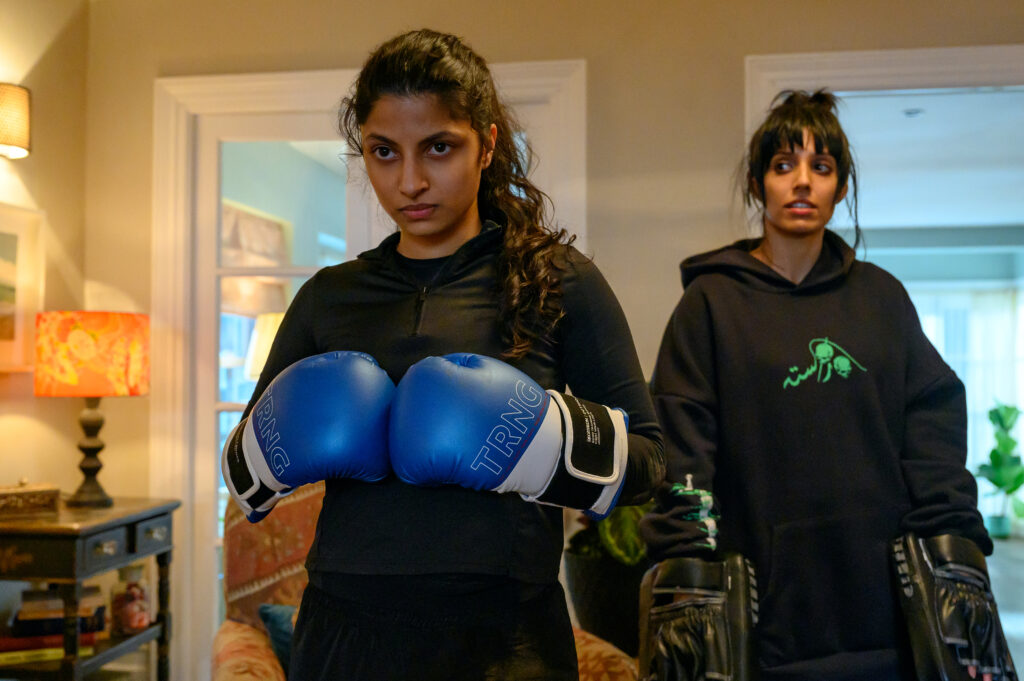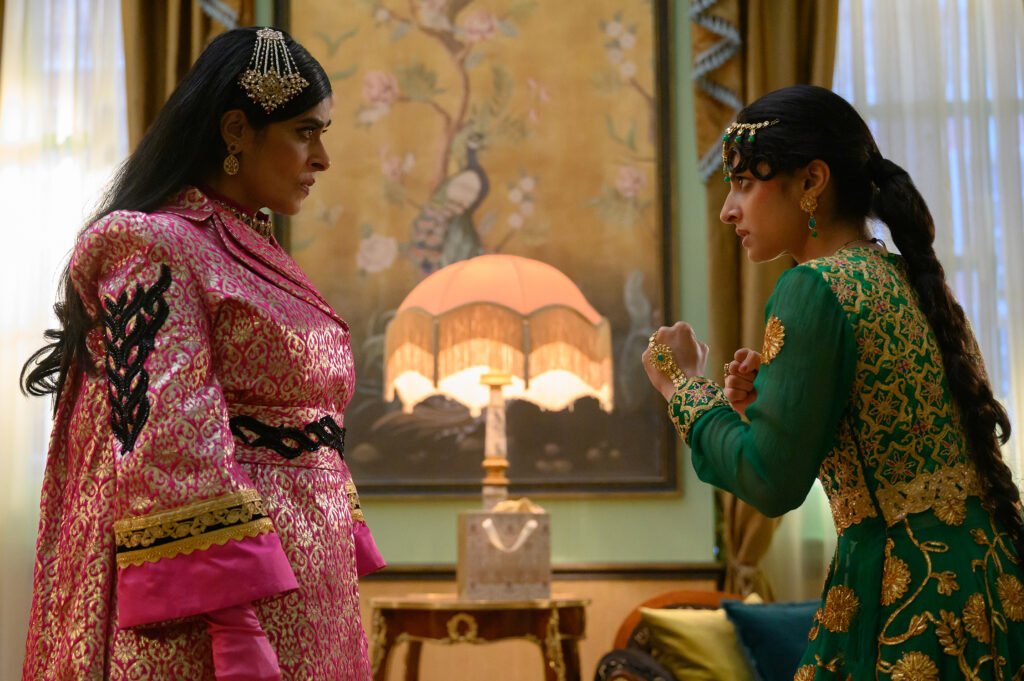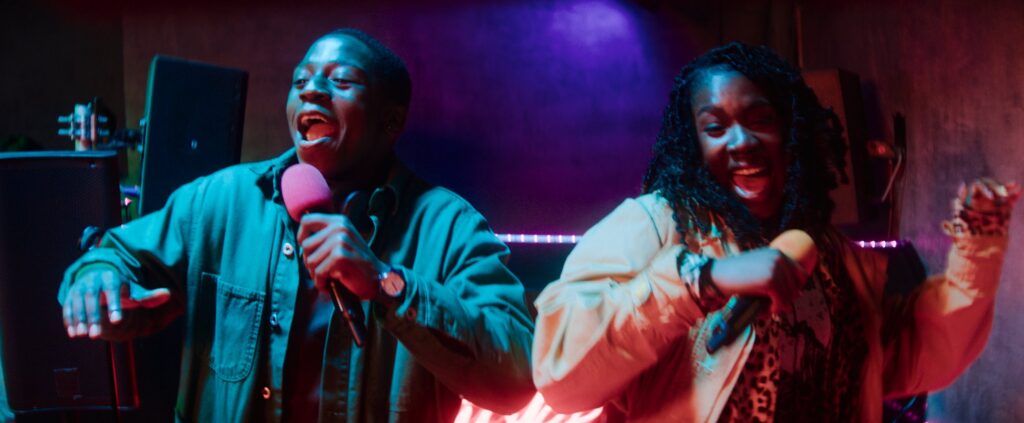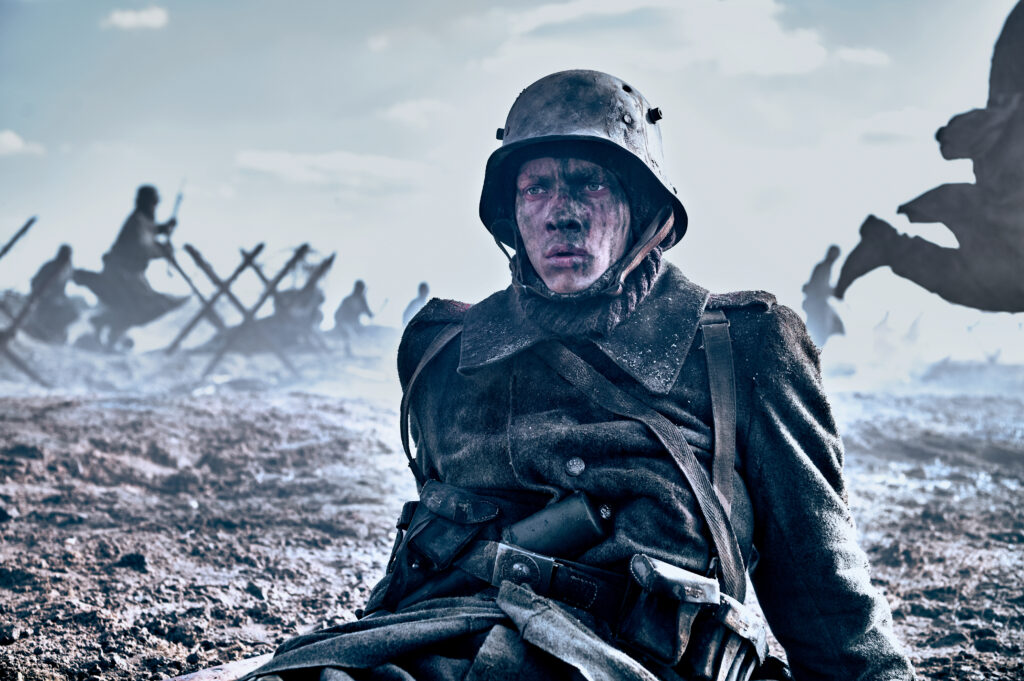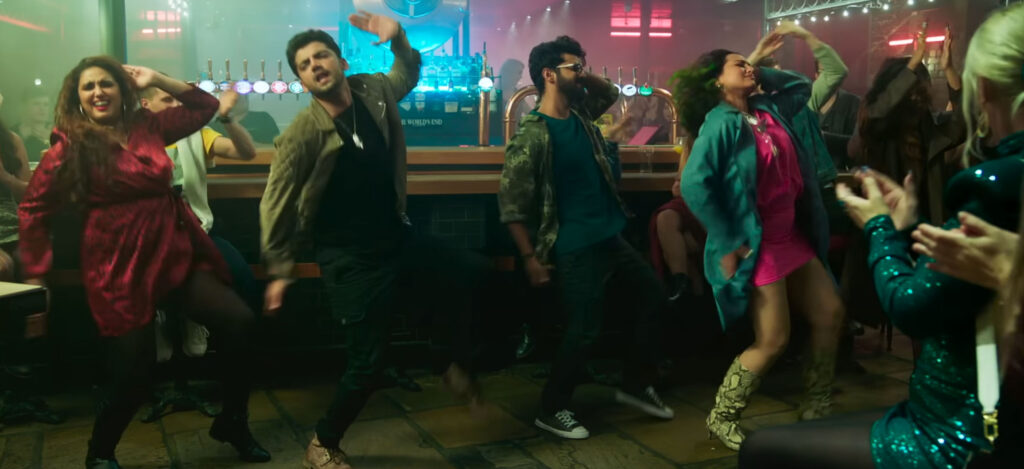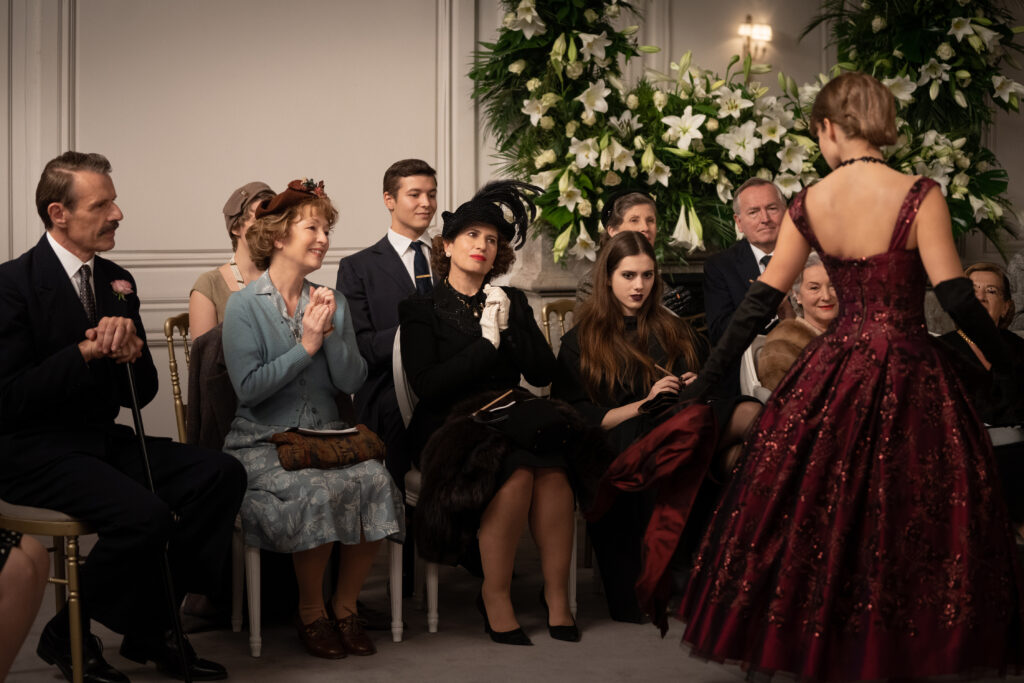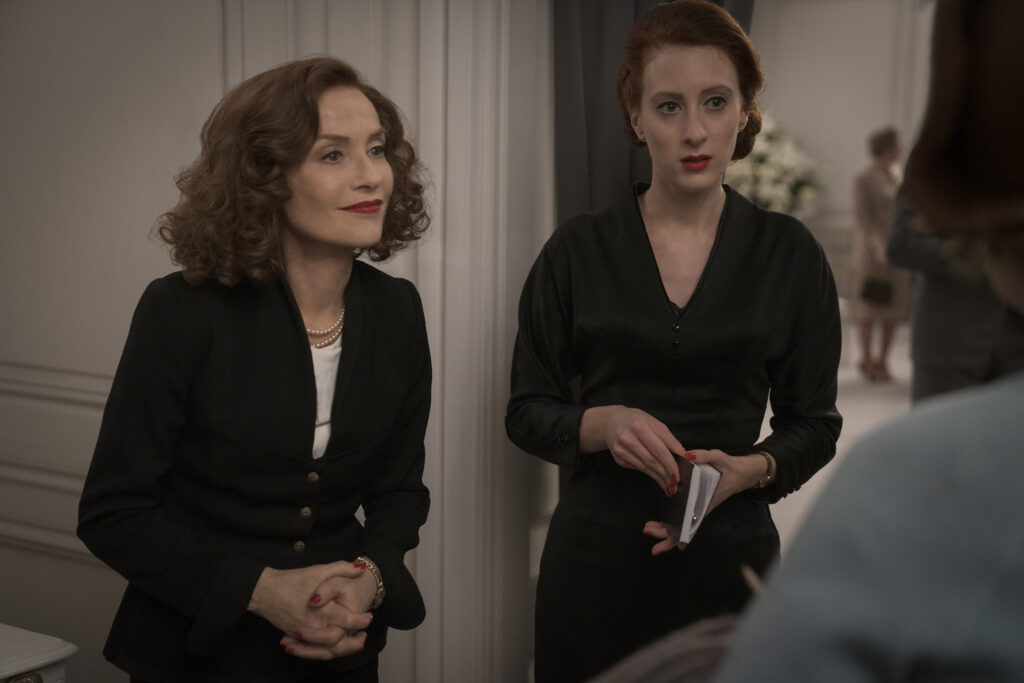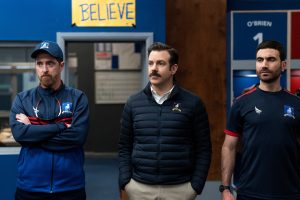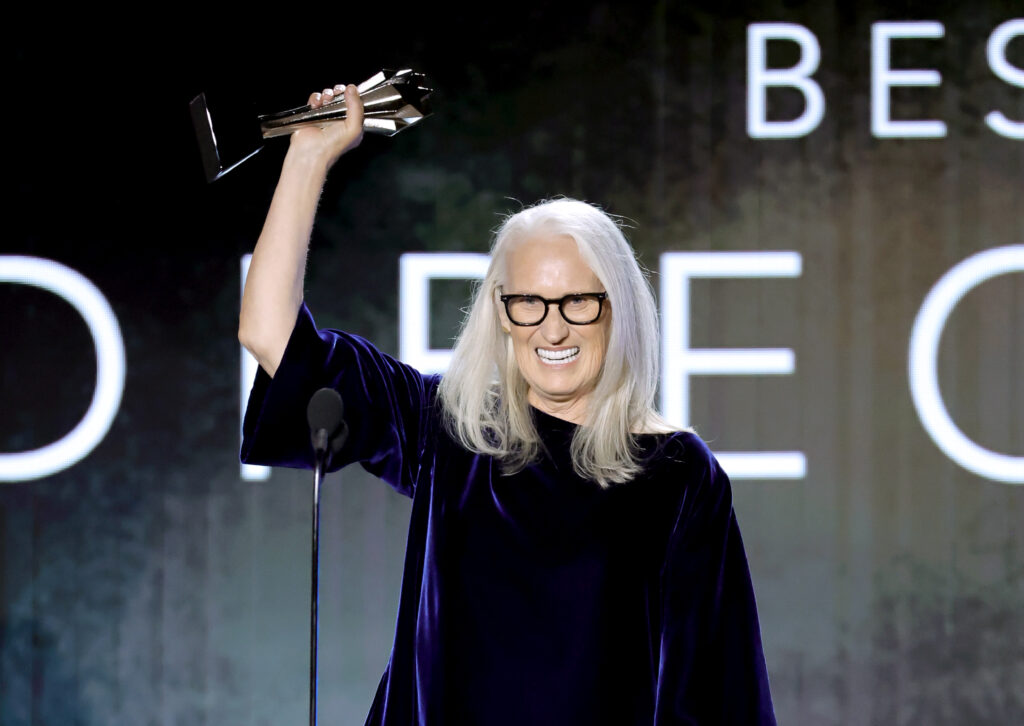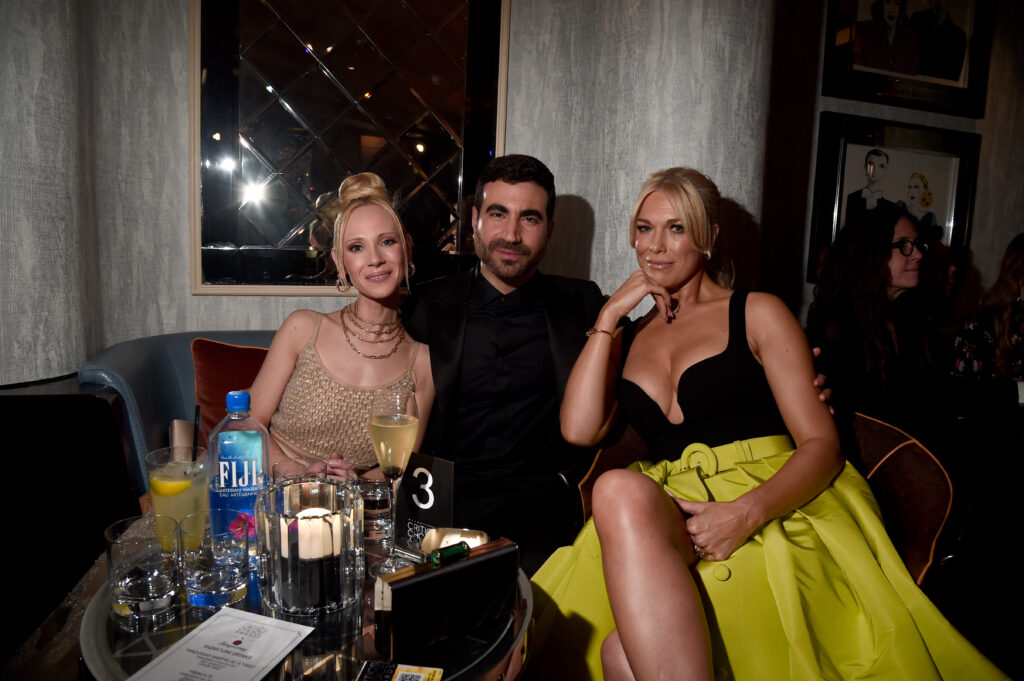June 7, 2023
by Carla Hay
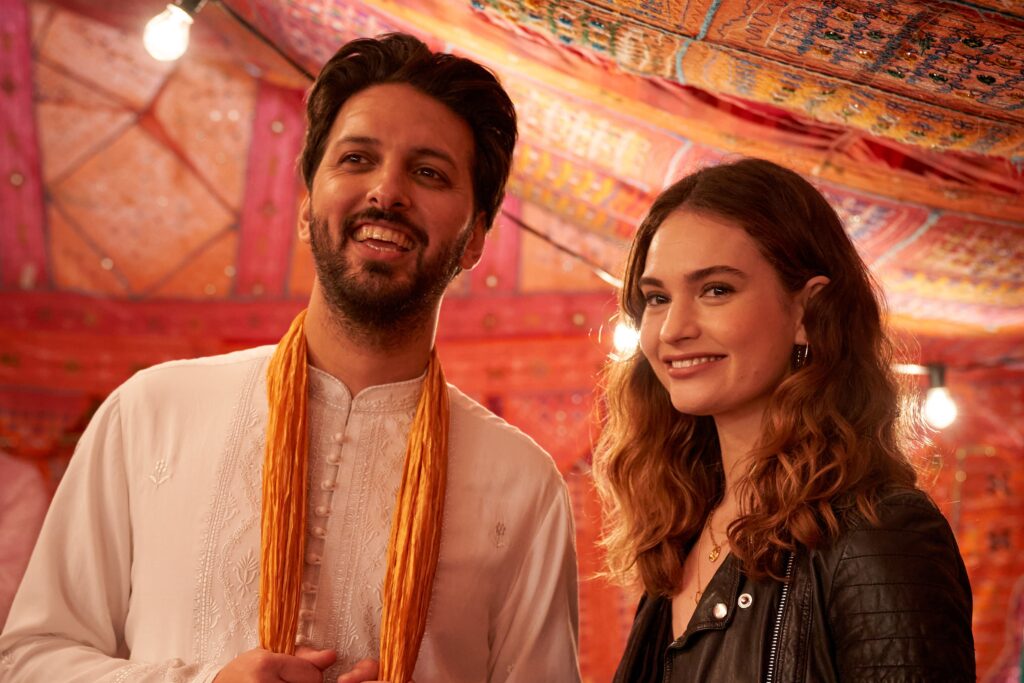
“What’s Love Got to Do With It?” (2023)
Directed by Shekhar Kapur
Some language in Urdu with subtitles
Culture Representation: Taking place in London and briefly in Pakistan, the romantic comedy/drama film “What’s Love Got to Do With It?” features a white and Pakistani cast of characters representing the working-class, middle-class and wealthy.
Culture Clash: A white British documentary filmmaker, who is cynical about love and committed relationships, does a documentary about her close male Pakistani British friend having an arranged marriage, and she struggles with admitting that she might actually want him for herself.
Culture Audience: “What’s Love Got to Do With It?” will appeal primarily to people who like capably acted romantic movies where friends could turn into lovers.
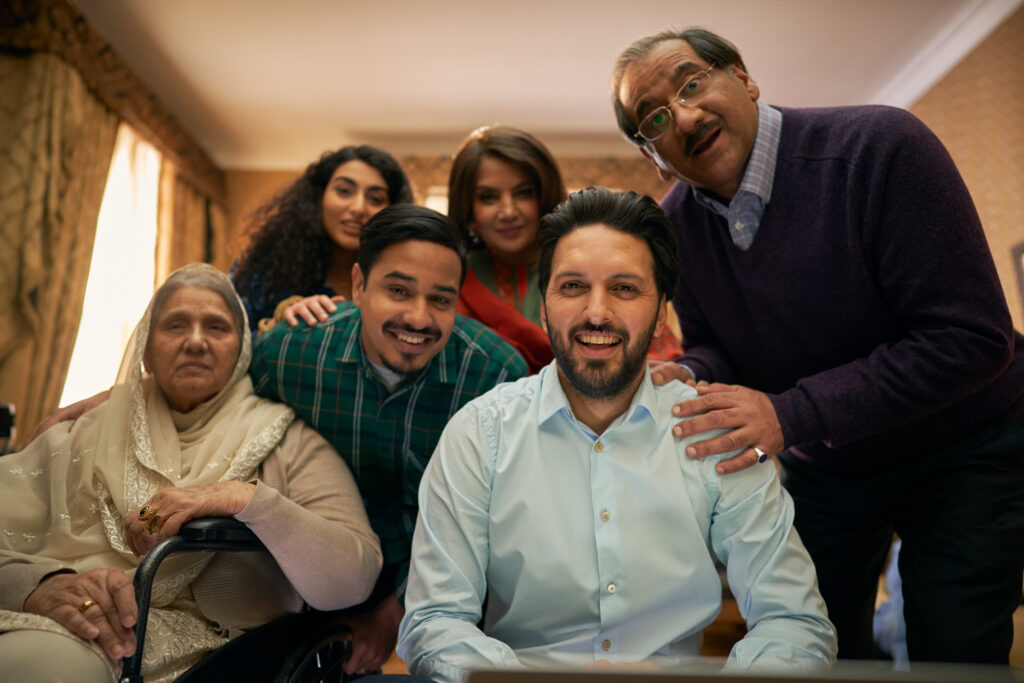
“What’s Love Got to Do With It?” gets its title from the hypothetical question about what is really the key to a successful marriage. Are compatibility and respect more important than love, in order for a marital union to last? This romantic comedy/drama follows a very predictable formula, but the engaging lead performances by Lily James and Shazad Latif make the movie watchable. It’s a rare Western-studio film that explores the South Asian culture of arranged marriages.
Directed by Shekhar Kapur and written by Jemima Khan, “What’s Love Got to Do With It?” (which takes place in London and briefly in Pakistan) is a mixed bag of a film that has dialogue that is sometimes witty, sometimes cringeworthy. The movie’s perspective of contrasting cultures keeps everything from sinking into forgettable blandness. Within the first 15 minutes of the film, it’s all very easy to predict how it will end.
In the meantime, most of the characters have enough appeal to be interesting but not enough uniqueness to be outstanding. A movie about two longtime best friends who could end up being lovers usually makes these two would-be lovers have opposite personalities. That’s certainly the case with documentarian Zoe Stephenson (played by James) and her longtime best friend Kazim “Kaz” Khan (played by Latif), who is a medical doctor.
Zoe and Kaz have known each other ever since their childhoods, when Zoe’s family (who are native Brits) and Kaz’s family (who are mostly Pakistani immigrants) used to be neighbors. Kaz is 32, and Zoe is about the same age. Zoe is impulsive, sometimes tactless, and has a messy love life. Kaz likes to plan ahead, is very diplomatic, and usually has stable relationships with the women he dates.
Zoe’s parents got divorced when Zoe was a child because her father left the family to be with a younger woman. Zoe’s mother Cath Stevenson (played by Emma Thompson) is still bitter about it. And although Zoe doesn’t really like to admit it, Zoe has also been negatively affected by the divorce, because she doesn’t think having a loving and committed relationship is going to happen to her.
Zoe is very close to her sister Helena (played by Alice Orr-Ewing), who is not as cynical about love and commitment as Zoe is. Helena and her husband Harry (played by Peter Sandys-Clarke) have two children together: Lily (played by Grace Askew) and Maud (played by Lolly Askew), who are about 7 to 9 years old. Zoe sometimes babysits her nieces, whom she adores. The movie uses a narrative technique of Zoe telling fairytales to Maud and Lily. The fairytales are really based on what Zoe is currently going through in her love life.
Kaz has two happily married siblings. His brother Farooq Khan (played by Mim Shaikh) is in an arranged marriage to Yasmin Khan (played by Iman Boujelouah), who is also of Pakistani heritage. Kaz’s sister Jamila (played by Mariam Haque) is married to a white Brit named David (played by Michael Marcus) in a non-arranged marriage. The parents of Kaz are well-meaning but domineering Zahid Khan (played by Jeff Mirza) and Aisha Khan (played by Shabana Azmi), who are also in an arranged marriage. Zahid’s mother Nani Jan Khan (played by Pakiza Baig) lives with Zahid and Aisha.
The Khan family is very close to each other, for the most part. The biggest rift in the family is that Zahid and Aisha do not approve of Jamila being married to someone who isn’t Muslim. Zahid and Aisha are also upset because Jamila did not take their advice to have an arranged marriage. As a result, Jamila has become estranged from the rest of the family.
The beginning of “What’s Love Got to Do With It?” shows the Khan family at a traditional Pakistani wedding, with Zoe and Cath also in attendance. At the moment, Zoe is feeling lovelorn because she hasn’t had any luck finding true love. She tells Kaz that at this point in her life, she’d be happy to settle for someone she likes instead of a grand love affair: “Someone I could commit to watching a whole TV series would be nice.”
And then, Kaz surprises Zoe with the news that he’s agreed to his parents’ wishes to get an arranged marriage to someone whom he hasn’t met yet. Kaz doesn’t like to call it an “arranged marriage.” He prefers to call it an “assisted marriage.” Zoe isn’t happy about this news because she thinks it’s a big mistake for Kaz to be in this type of marriage. She says out loud to him that she thought he had more independence to make his own decisions on whom to marry.
Shortly after getting this news, Zoe has a meeting with two movie producers named Olly (played by Alexander Own) and Sam (played by Ben Ashenden), two fast-talking filmmakers who have a “film bros” attitude tinged with sexism. Olly and Sam tell Zoe that they’re not moving forward with her pitch to do a documentary about honor killings. Sam and Olly think the subject matter is too depressing and not something that they think a woman filmmaker should do.
Zoe is desperate to get financing for her next project, so she impulsively tells Olly and Sam that her next documentary will be about arranged marriages, with her friend Kaz as the main subject. She also spontaneously thinks of the documentary’s title: “Love Contractually,” in a cheeky nod to the title of the 2003 romantic dramedy “Love Actually.” Olly and Sam like this idea and give the go-ahead to Zoe to do the movie.
Zoe lies and says that Kaz and his family have agreed to be in the documentary. Luckily for her, she quickly persuades Kaz and his family to do the documentary by promising them that she will be respectful of their Pakistani and Muslim customs. Kaz is reluctant at first, but he changes his mind when Zoe convinces him that she will make everyone look good. And as soon as she makes this promise, you just know that something will go very wrong.
“What’s Love Got to Do With It?” then goes back and forth between showing Zoe working on the documentary and trying unsuccessfully to find her next boyfriend. Cath, who has a dog named Barney, asks Zoe to take Barney to a veterinarian named James (played by Oliver Chris), a nice guy who just happens to be an eligible bachelor. It’s all a matchmaking setup from Cath. Zoe resists it at first, but she eventually agrees to date James out of sheer loneliness and desperation.
Meanwhile, Zoe gets more irritable as Kaz’s wedding date gets closer. Kaz’s bride-to-be is a 22-year-old aspiring human rights attorney named Maymouna (played by Sajal Ali), who is seemingly quiet and reserved. Kaz and Maymouna like each other, even though their conversations are awkward, as they get to know each other better. Kaz doesn’t quite understand why Zoe isn’t very happy that he’s getting married. You know where this is all going, of course.
To the movie’s credit, “What’s Love Got to Do With It” doesn’t portray the principal characters as ideal human beings. Zoe is not a perfectly likeable heroine. She’s got some big flaws, including having horrible judgment when it comes to dating, as well as a tendency to let her pride get in the way of being honest about her feelings.
Zoe’s mother Cath can be very prickly and difficult. Cath also has a racist side, such as in a scene where Cath privately tells Zoe that Cath is amazed that Kaz’s Pakistani family is sophisticated because the family is Pakistani. As for Kaz, his main personality flaws are his stubbornness and his reluctance to admit to his mistakes. Kaz’s tendency to be a people pleaser sometimes leads him to be deceptive in ways that can hurt people, including himself.
“What’s Love Got to Do With It?” doesn’t clutter up the movie with too many characters, but parts of the film lack focus, such as when it goes off on a tangent by showing some of the things going on in the marriage of Helena and Harry. Asim Chaudhry has a brief but hilarious supporting role as Mohammad “Mo” Bagri, a London-based matchmaker whose specialty is matchmaking for people of South Asian heritage. He has a company called Mohammad Bagri’s Matrimonial Bureau that is featured in Zoe’s documentary, because the Khan family is a client.
Although some of the characters occasionally come close to being caricatures, the principal characters (the Kaz’s family and Zoe’s family) all retain realistic qualities. “What’s Love Got to Do With It?” benefits from having a talented cast that can portray these characters with a certain level of believability. James and Latif have good-enough chemistry, but it’s not great. Thompson, as Zoe’s mother Cath, is always a delight to watch, even when she’s portraying a character who says and does off-putting things.
What isn’t as believable is some of the inevitable, contrived mush that gets crammed into the latter part of the movie, in order to deliver the resolutions that most audiences expect for this type of romantic film. “What’s Love Got to Do With It?” shows flashes of clever satire, such as in how Olly and Sam represent the smarmy side of the film industry. But in the end, “What’s Love Got to Do With It?” succumbs to conventionality. Considering the subject matter, it’s not a surprise, but it’s handled capably enough for it to deliver some genuinely funny scenes amid the romantic fluff.
Shout! Studios released “What’s Love Got to Do With It?” in select U.S. cinemas on May 5, 2023. The movie was released on digital and VOD on May 26, 2023.

